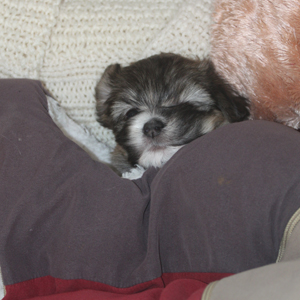 Recalling our child raising years I recall at the time that each new child care book contradicted the last. I doubt it’s much different in the dog world. There are always exceptions to all rules. So, in our opinion and based on our own experiences, these are the stages that our Havanese puppies go through from birth:
Recalling our child raising years I recall at the time that each new child care book contradicted the last. I doubt it’s much different in the dog world. There are always exceptions to all rules. So, in our opinion and based on our own experiences, these are the stages that our Havanese puppies go through from birth:
STAGES
1 - 2.5 weeks (1 - 17 days)
The puppy needs warmth, food, sleep and his mother. Neurologically very primitive, the puppy responds by reflex and essentially it is unable to learn.
18 Days to 4th week (18 - 28 days)
The puppy needs its mother most at this time. It is a period of extremely rapid sensory development. Neurologically the brain is suddenly able to receive messages: the circuits are "turned on". Weaning should not take place at this time: the puppy is extremely vulnerable.
5th - 7th week (29 - 49 days)
The puppy needs his mother and littermates. Dogs removed from the litter at this period tend to be unable to socialise with other dogs, may fight, refuse to breed, etc. Contact with humans and gentle training is beneficial and helps the pup set the stage for more intense contact with humans later on.
7th week (49 - 56 days)
This is the ideal time for the puppy to start socializing with its new owners with a visit. Mentally he is able to learn whatever any adult dog can learn, his brain is neurologically complete. However, physically he will not be able to do the task of an adult dog. Socialisation and training should continue on a regular basis. Bonds formed at this time are extremely strong.
8 - 10 weeks (57 - 70 days)
This is the fear imprinting period. Any traumatic experience such as shipping, ear cropping, severe punishment, etc. may have a lasting effect on the dog. New experiences must be non-fear producing. Proper training and socialisation should continue. This is where you can see a fairly outgoing pup hesitate. That doesn't mean you do not socialize it but you are aware that this is a temporary period during which time you should proceed with awareness and conditioning in a positive way.
11 - 16 weeks (71 - 112 days)
The puppy continues to learn from his experiences. If left with other dogs, he may imprint only to dogs: taking his leadership from them and never developing a strong relationship with human beings. It is important to promote balance and train (start at home until they can attend classes) to create human/havanese bonds. Lack of socialisation can promote hesitancy. Lack of exposure to other environments and exploration may result in "kennel syndrome" where the dog is unable to cope with any change from his routine environment. Even though he/she has yet to have its 2nd vaccination, it is imperitive that you socialize but do so safely. Take them to pet stores and have people pet or give them a treat but don't place them on the ground. Expose them to elevators, various types of people from those in wheelchairs, or using walkers, to funny or religious head coverings. Expose them to a number of noises from thunderstorms on your computer to a dropped pan. They will react many times but as they know that no harm comes their way from such a sound, they get conditioned. Slow conditioning is important. A collar and lead should be placed on them to condition them before classes.
During this week (week 7), we will be taking our puppies in new rooms, out front, around the block in our arms all to expose them to car noises, different environments etc. At 8 weeks they will get their first car ride to the vets and we will continue a number of drives all ending positively after the vet experience. Our goal is to give you the best headstart that you and your puppy deserves. But you need to continue this process. You must set aside 5 to 10 minutes daily for training, socialization and exposing them to new things. Consistency is key.
If you do not have other dogs to socialize your little one too, they are welcomed to come here for a visit, daycare, overnights etc. Visits are free but daycare, overnights, grooming are all extras we do when there is a need.
© Content published on this page has been a collaborative effort and provided by, and copyrighted by Darlah Potechin and Nathan Potechin (talemakerhavanese.com). No unauthorized reproduction or re-publication in any medium whatsoever is permitted without prior written permission.
